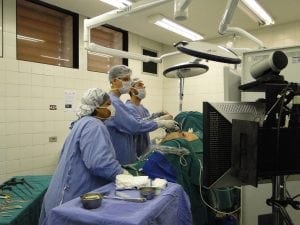Welcome to Study of the Week from Patient Worthy. In this segment, we select a study we posted about from the previous week that we think is of particular interest or importance and go more in-depth. In this story we will talk about the details of the study and explain why it’s important, who will be impacted, and more.
If you read our short form research stories and find yourself wanting to learn more, you’ve come to the right place.

This week’s study is…
Antireflux surgery versus antireflux medication and risk of esophageal adenocarcinoma in patients with Barrett’s esophagus
We previously published about this research in a story titled “Does Antireflux Surgery for Barrett’s Esophagus Change Esophageal Cancer Risk? “which can be found here. The study was originally published in the scientific journal Gastroenterology. You can read the full text of the study here.
This research team was associated with the Karolinska Institute.
What Happened?
Barrett’s esophagus is a medical condition in which the mucosal cells of the lower esophagus undergo a change from stratified squamous epithelium to simple columnar epithelium along with interspersed goblet cells. This is a pattern that is usually found only in the small and large intestine. Barrett’s esophagus is regarded as a premalignant condition, and greatly increases the risk of esophageal cancer, specifically esophageal adenocarcinoma.
Barrett’s esophagus can be treated with anti-reflux medication and with anti-reflux surgery, and prompt treatment can reduce the risk of the condition turning into cancer. The goal of this study was to determine if treatment with surgery could reduce the risk of a patient’s condition developing into esophageal adenocarcinoma. Prior comparisons of medications versus surgery have been inconclusive in their results.
This study was multinational in scope and included a total of 33,939 people living with Barrett’s esophagus. Patients from Norway, Denmark, Sweden, and Finland were included. 1.6% of the patients received anti-reflux surgery, while 98.4% were treated with anti-reflux medications. The follow-up period was 32 years, and during that time, 437 cases of esophageal adenocarcinoma were found in the medication group, while 14 were found in the surgery group.
The team found that surgery did not decrease the risk of cancer; in fact, those that received surgery appeared to be at an increased risk relative to those that used medication. This association was still present after eliminating the first year of follow-up. Through the follow-up period, the risk of cancer tended to increase over time in the surgery group.
The researchers concluded that patients that are seeking to reduce their risk of cancer should continue with medication therapy if at all possible. Furthermore, those patients that have received anti-reflux surgery for Barrett’s esophagus should stay committed to their cancer surveillance programs.
About Esophageal Cancer
Esophageal cancer appears in the passageway from the mouth to the stomach. While it is generally rare, it is a dangerous type of cancer because it is often diagnosed at an advanced stage. This is due to the fact that esophageal cancer rarely causes pronounced symptoms in its early stages. There are a number of risk factors, including the consumption of very hot beverages, alcohol, betel nut, and tobacco use, acid reflux, consumption of pickled and processed foods, and obesity. Men are more vulnerable to esophageal cancer than women, since female hormones play a protective role. Symptoms include difficulty swallowing, a hoarse voice, weight loss, vomiting blood, swollen lymph nodes, and pain in the chest and when swallowing. Even with thorough treatment, the five-year survival rate in the U.S. is just 15 percent. To learn more about esophageal cancer, click here.
Why Does it Matter?
This study has demonstrated a clear difference in outcomes for medications versus surgical treatment for people that are living with Barrett’s esophagus, a premalignant condition that can easily transform into full blown cancer, which is valuable knowledge for both patients and physicians.
Overall, medication is generally preferred to manage Barrett’s esophagus over surgery in the vast majority of cases and is really only indicated for patients that have the most severe acid reflux or who fail to respond to anti-reflux medications. Therefore, it’s likely that the increase in risk seen in surgical cases is linked to the greater exposure to acid reflux in these cases, versus any side effect or inherent characteristic of the surgical procedure itself.






